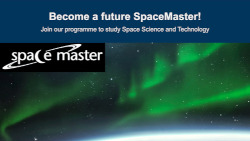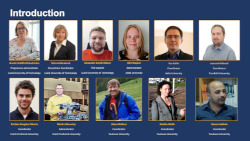SpaceMaster - International / Multidisciplinary / Personalized
Connected to the World of Work
The online application is closed now. It will open again for the intake 2026 on October 16, 2025.
Special SpaceMaster Webinar for prospective students, December 12, 2024 (watch the recording)
Joint Master Program in Space Science and Technology - SpaceMaster
SpaceMaster VI (2024-2030) is the continuation of the original Erasmus Mundus Joint Master Degree programs launched in 2004 and implemented by a consortium of leading European universities in close collaboration with research and industrial organizations.
Consortium of Universities responsible for the SpaceMaster Program:
Associated Partners:
Student Organisations
Objectives
The main objective of the Program is to combine the great diversity of space expertise at five universities into a common platform. The educational cooperation is supported by scientific and industrial organisations, thus providing direct contact with professional research and industry. SpaceMaster therefore offers cross-disciplinary, research-oriented education with first-hand and hands-on experience in space science, technology and engineering.
The Program’s structural mobility allows students to receive knowledge from a number of fundamental academic disciplines within one educational program, i.e. aerospace engineering, atmospheric science, signal processing, space science, space technology and robotics. Students can apply for one of five engineering and three scientific tracks:
- Space Technology and Instrumentation, Luleå University of Technology
- Atmospheric and Space Science, Luleå University of Technology
- Space Robotics and Automation, Aalto University, School of Electrical Engineering
- Small Satellites and Space Instrumentation, Aalto University, School of Electrical Engineering
- Dynamics and Control of Systems and Structures, Cranfield University
- Space Automation and Control, Czech Technical University in Prague
- Space Technique and Instrumentation, Université Toulouse III - Paul Sabatier
- Astrophysics, Space Science and Planetology, Université Toulouse III - Paul Sabatier.
The Program attracts ambitious students with high academic performance from countries around the world. Our students' professional qualifications have been recognized by the international academic community through student publications in peer-reviewed scientific journals and conference proceedings, as well as regular participation in international conferences, e.g. the European Geophysical Union General Assembly Conference, International Astronautical Congress and ESA Symposium on European Rocket and Balloon Programs and Related Research.
The academic staff members at the partner universities are active researchers who implement recent scientific achievements in their respective fields into the Program curriculum. The main learning outcomes for the Program are:
- fundamental and advanced knowledge in the academic subjects studied
- holistic approach to and comprehensive view of advanced space projects
- management skills required for space projects, e.g. systems on-board aircraft or satellites, techniques for satellite launch, interplanetary missions, Earth observation, space data management
- transferable skills, e.g. entrepreneurship, scientific writing, social competence, communication skills, leadership in an international and intercultural environment.
The added value of SpaceMaster compared with other programs in the same field can be summarised as:
- structured cooperation between the academic institutions and industry
- education influenced by current advances in research
- increased intercultural understanding and integration
- structured cooperation between the universities via the use of the ECTS grading system, combining together different educational models
- exchange of experience for both the academic and administrative staff
- a wide range of specializations improves career prospects of students.
Program Structure
SpaceMaster is a four semester Master's Program, 120 ECTS. The first year takes place at LTU, Kiruna Space Campus, Sweden (60 ECTS). The second year (together with the Master's thesis project) takes place at one of the Partner Universities. The Master's thesis project can also take place at Associate Partners as well as other industrial and research organizations relevant to the Program scope. A detailed description of the Program tracks and modules is given under Studies.
The language of instruction is mainly English.
Degrees Awarded
Each Partner University confers a Master's Diploma based on national legislation and institutional rules. The Master's Degree is achieved after successful accomplishment of 120 ECTS. SpaceMaster students who fulfill the requirements for the Master's Degree are eligible for a Master's Diploma certificate from Luleå University of Technology and a Master's Diploma certificate from the partner university where they studied during the second year.
Labour Market
The main advantages of the SpaceMaster Program are broadened horizons and a reputation of excellence. The Program graduates work with fundamental and applied research, technology and engineering. The education is an excellent foundation for students aiming at an academic research career. SpaceMaster provides its graduates with a broad professional network among research institutions, industrial partners and agencies.
The very high level of professional qualification results in a high employability rate among program graduates, i.e. 92% employment within one year vs. the 70% average rate among Erasmus Mundus Master Program graduates, according to the Erasmus Mundus Association. SpaceMaster graduates work at ESA-ESTEC, DLR, CNES, Airbus Defense and Space, Thales Alenia Space, OHB System, SSC Space, IRF etc.

